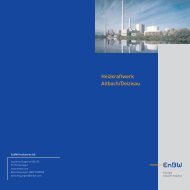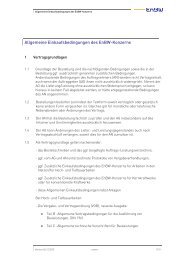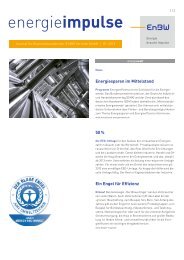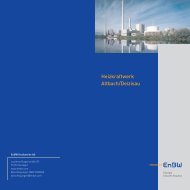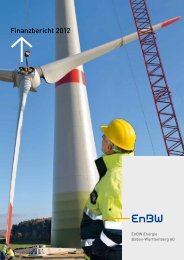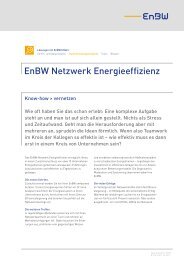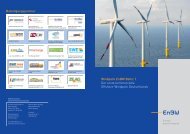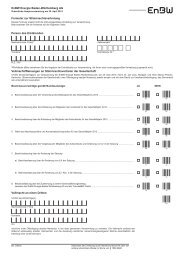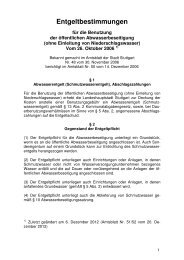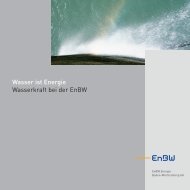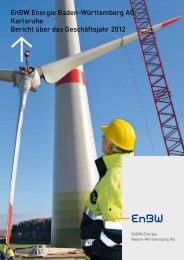Environmental Report 2000 - EnBW
Environmental Report 2000 - EnBW
Environmental Report 2000 - EnBW
You also want an ePaper? Increase the reach of your titles
YUMPU automatically turns print PDFs into web optimized ePapers that Google loves.
Further Information<br />
Combating global warming by preventing pollutant emission<br />
The last piece of scientific evidence might still be lacking to prove beyond doubt that the<br />
greenhouse effect is the cause of global warming. But it still makes sound sense to take<br />
precautions and limit emissions of greenhouse gases. The recently published third Scientific<br />
<strong>Report</strong> of the UN predicts a rise in temperature of between 1.4 – 5.8 °C by the end of<br />
the century.<br />
The Federal Republic of Germany has<br />
committed itself to reducing the<br />
emission of greenhouse gases by<br />
21% compared to the 1990 level by<br />
2012.<br />
In <strong>2000</strong>, Germany succeeded in recording<br />
a noticeable drop of 15% in<br />
CO2 in the atmosphere compared to<br />
1990. This was largely due to efforts<br />
of industry (minus 31%) and the energy<br />
sector (minus 16%). In the same<br />
period CO2 emission levels from private<br />
households and traffic grew by<br />
between 6% and 11%.<br />
A voluntary commitment to<br />
climate protection<br />
Last year within the framework of the<br />
Climate Agreement of German Industry,<br />
German energy companies reaffirmed<br />
the voluntary commitment to<br />
climate protection they made in 1995.<br />
As a further supplement to this, we<br />
are participating in the “Action Programme<br />
of the Energy Industry for the<br />
Protection of the Climate”, through<br />
which the electricity industry will<br />
make a pledge to the government to<br />
promote cogeneration concepts and<br />
other measures for the reduction of<br />
CO2 emissions with the objective of<br />
preventing the emission of up to 45<br />
million tonnes of CO2 by 2012.<br />
52<br />
We have played an active and varied<br />
role in helping to reduce greenhouse<br />
gas emissions – for instance through<br />
our use of nuclear and hydroelectric<br />
power. In <strong>2000</strong> our overall nuclear<br />
energy production quota was 41.3%<br />
(own production 55%) and our hydroelectric<br />
power production quota was<br />
10.6% (own production 13.9%).<br />
Making more use of “water<br />
power”<br />
We were able to achieve this high<br />
level of CO2 -free electricity production<br />
by increasing our purchasing<br />
quota of hydroelectric power by 30%.<br />
This represents an equivalent saving<br />
of around 31.7 million tonnes of CO2. However, the lignite power station in<br />
Lippendorf in Saxony, in which we<br />
have a 432 megawatt stake, is now<br />
operating throughout the year for the<br />
first time and this has increased our<br />
overall CO2 emission by around 2 million<br />
tonnes: a consequence of the<br />
politically driven investment <strong>EnBW</strong><br />
has made to sustain jobs in east<br />
Germany.<br />
At 225 grams per kilowatt hour, the<br />
CO2 emission factor for our own production<br />
is still 60% below the mean<br />
value for Germany.<br />
We intend to further strengthen our<br />
commitment to energies from renewable<br />
sources, to reduce CO2 emission<br />
levels by more limited use of the old<br />
units 5 and 6 in Heilbronn and to continue<br />
to employ sewage sludge as a<br />
substitute fuel.<br />
Our non-domestic activities with our<br />
company holdings and the transfer of<br />
know-how are in line with the Kyoto<br />
Protocol provisions for the reduction<br />
of CO2 emissions. Thus, we are helping<br />
to improve production efficiency<br />
at the Matra lignite power plant in<br />
Hungary whilst our holdings in Czech<br />
and Polish companies give us leverage<br />
to promote the expansion of<br />
district heating systems. In Thailand,<br />
too, we have acquired holdings in<br />
companies constructing the technologically<br />
advanced gas-fired gas-andsteam<br />
plants.<br />
Commissioned by the Ministry for the<br />
Environment in Baden Württemburg<br />
in conjunction with <strong>EnBW</strong>, the Fraunhofer<br />
Institute in Karlsruhe is producing<br />
a manual on the use of the flexible<br />
instruments of the Kyoto Protocol.<br />
Concrete <strong>EnBW</strong> projects will<br />
serve to illustrate the issues involved<br />
in the approval of projects under the<br />
definitions of the Kyoto Protocol. The<br />
manual will be published in 2001.<br />
<strong>Environmental</strong> protection costs money<br />
<strong>EnBW</strong> has spent € 64 million for environmental protection in the energy sector.<br />
And, despite the pressure of competition, we also increased expenditure on<br />
environmental protection by 25% in <strong>2000</strong>.<br />
Over the past few years our main investment<br />
priorities have been for the<br />
protection of water and promotion of<br />
clean air. Last year costs in these areas<br />
amounted to approx. € 5.4 million.<br />
Avoided CO2 Emissions<br />
through <strong>EnBW</strong> electricity generation using<br />
non-fossil primary energy<br />
in million tonnes a year<br />
31.4 31.3<br />
30<br />
30.6<br />
27.5<br />
28.6<br />
25<br />
20<br />
15<br />
10<br />
5<br />
0<br />
1996 1997 1998 1999 <strong>2000</strong><br />
Nuclear Power<br />
Hydropower<br />
Compared with last year, investments<br />
and operating costs for environmental<br />
protection facilities have increased by<br />
25% to € 64 million. This increase in<br />
outlay is due to the extensive preventive<br />
maintenance inspections of the<br />
flue gas cleaning plants and the cooling<br />
tower at the Heilbronn plant. The<br />
modernisation of the cooling tower at<br />
Philippsburg is being continued.<br />
The “water pfennig”, which contrary<br />
to the rules of fair competition is only<br />
levied in this amount in Baden Württemburg<br />
for the use of ground and<br />
surface water, cost us around € 18<br />
million in <strong>2000</strong>.<br />
From overall expenditure on the environment<br />
3.4% went for disposal and<br />
treatment, 42% for water protection,<br />
49% for clean air protection and noise<br />
abatement, 5.1% for nature conservation,<br />
0.1% for soil protection and 0.4%<br />
for environmental management (EMS).<br />
<strong>Environmental</strong> protection measures in<br />
our power plants last year cost over<br />
€ 60 million and thus accounted fort<br />
the lion’s share of our environmental<br />
investment outlay followed by the Regionalgesellschaft<br />
company with its<br />
key investment of € 1.9 million for the<br />
protection of birds.<br />
Waste T€ 2,175<br />
Water T€ 26,841<br />
Air T€ 31,271<br />
Noise T€ 37<br />
Nature T€ 3,283<br />
Soil T€ 75<br />
EMS T€ 243<br />
Total T€ 63,925<br />
T = Thousand<br />
Outlay for Environmetal Protection<br />
in thousand €<br />
Air<br />
31,271<br />
35<br />
30<br />
25<br />
20<br />
15<br />
10<br />
5<br />
0<br />
Nature 3,283<br />
Noise, Soil<br />
and EMS 355<br />
Waste 2,175<br />
Water<br />
26,841<br />
53



